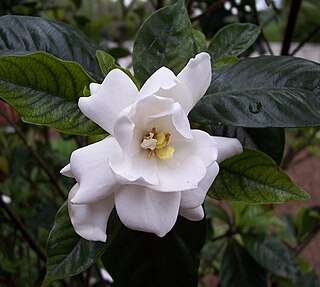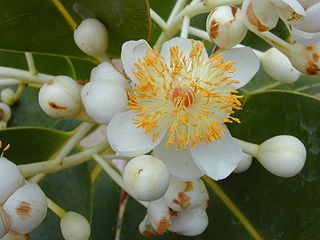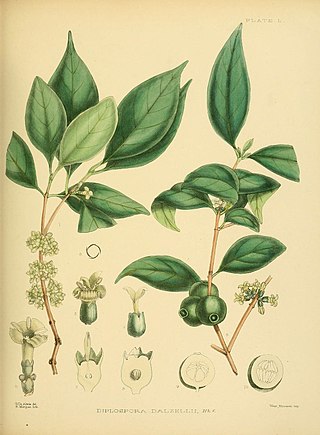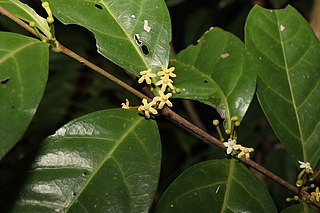
Melicope is a genus of about 240 species of shrubs and trees in the family Rutaceae, occurring from the Hawaiian Islands across the Pacific Ocean to tropical Asia, Australia and New Zealand. Plants in the genus Melicope have simple or trifoliate leaves arranged in opposite pairs, flowers arranged in panicles, with four sepals, four petals and four or eight stamens and fruit composed of up to four follicles.

Gardenia is a genus of flowering plants in the coffee family, Rubiaceae, native to the tropical and subtropical regions of Africa, Asia, Madagascar, Pacific Islands, and Australia.

Palaquium is a genus of about 120 species of trees in the family Sapotaceae. Their range is from India across Southeast Asia, Malesia, Papuasia, and Australasia, to the western Pacific Islands.

Calophyllum is a genus of tropical flowering plants in the family Calophyllaceae. They are mainly distributed in Asia, with some species in Africa, the Americas, Australasia, and the Pacific Islands.

Litsea is a genus of evergreen or deciduous trees or shrubs belonging to the laurel family, Lauraceae. The genus includes a large number of accepted species in tropical and subtropical areas of North America and Asia.

Beyeria is a genus of shrubs and small trees in the family Euphorbiaceae known as turpentine bushes. It was first described as a genus in 1844. The entire genus is endemic to Australia.

Psydrax is a genus of flowering plants in the family Rubiaceae. It consists of trees, shrubs, and a few lianas in the paleotropics.

Xanthostemon is a genus of plants in the myrtle family Myrtaceae, first described in 1857 by the German–born Australian botanist Ferdinand von Mueller. The genus is distributed across Malesia, Papuasia and northern Australia. The genera Pleurocalyptus and Purpureostemon from New Caledonia are morphologically close to Xanthostemon.

Meiogyne is a genus of flowering plants with 38 species belonging to the family Annonaceae. It is native from southwestern India and Indochina to Australia, including Fiji and New Caledonia. The type species is Meiogyne virgata.

Vanguerieae is a tribe of flowering plants in the family Rubiaceae and contains 671 species in 29 genera. It is one of the most species-rich groups within the family and it is distributed across the Paleotropics.

Atractocarpus is a genus of flowering plants in the family Rubiaceae. Its members are commonly known as native gardenias in Australia. The genus name is derived from the Ancient Greek terms atractos "spindle", and karpos "fruit", from the spindle-shaped fruit of the type species.

Coptosperma is a genus of flowering plants in the family Rubiaceae. It contains 19 species native to Africa, the Arabian Peninsula, and various islands of the Indian Ocean.

Discospermum is a genus of flowering plants in the family Rubiaceae. The genus is found from India to the Philippines.

Gardenieae is a tribe of flowering plants in the family Rubiaceae and contains about 586 species in 53 genera.

Gynochthodes is a genus of flowering plants in the family Rubiaceae. The genus is found from Madagascar to tropical and subtropical Asia and the Pacific region.

Cyclophyllum multiflorum is a small tree in the family Rubiaceae reaching 4–10 m (13–33 ft) in height. It is endemic to Queensland and occurs from around Rossville, south to around Mount Elliot. It grows in both rainforest and wet sclerophyll forests, at altitudes from near sea level to about 1,120 m (3,670 ft).
















